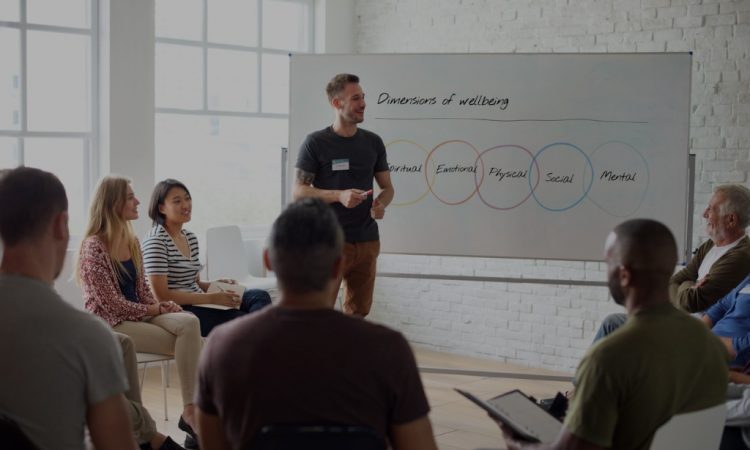“There can be no health without mental health.” – Prince et al., 2007
In the course of a day, career development professionals (CDPs) hear many stories from their clients –stories of joy and hope, and stories of pain and sorrow. The emotional highs and lows these stories provoke are part of the job, but they take their emotional toll. While workplaces can lend support and empathy to CDPs, they can also be places where compassion fatigue runs rampant, and where CDPs struggle with their own mental health issues while in service to others.
Recognizing that our members were becoming more and more susceptible to compassion fatigue, burnout and stress, and based on a needs assessment undertaken in 2016, the NSCDA embarked on an ambitious new initiative. We set out to create a network of Mental Health Champions throughout Nova Scotia Works (NSW), a province-wide system of job search and career advice centres.
Where we started
Employment is considered one of the foundational pieces supporting positive mental health. The corollary is that workplaces can be unhealthy and contribute to mental illness in the workplace. It is no different for CDPs and the places they work. Origins of the Mental Health Champions (MHC) concept are grounded in the experiences of client-facing workers, who anecdotally report that their clients are increasingly presenting with multiple and complex barriers, and with these barriers come stories of mental health and addiction issues, homelessness, abuse, poverty, discrimination, marginalization and more.
Inspired by the Mental Health Commission of Canada’s (MHCC) Guide to Recovery-Oriented Practice and a CERIC project we had been working on, Charting the Course: Mapping the Career Practitioner Role in Supporting People with Mental Health Challenges, we developed the Career Services Guide: Supporting People Affected by Mental Health Issues. This body of work formed the foundation of our thinking.
Integral to the program is an understanding of recovery-oriented practice, which promotes the notion that appropriate employment is good for mental health. It is a gateway to social and economic inclusion. People do not need to be free of mental illness symptoms to be successfully employed. CDPs have vital skills and access to resources that can support work-based recovery through partnerships with their clients and community. They inspire hope and provide guidance for a way forward.
Who are Mental Health Champions?
The MHC role is performed by CDPs on a volunteer basis. Their role is to ensure: 1.) Awareness of and engagement with their co-workers around the recovery-oriented and career services guides, 2.) Knowledge of mental health supports and resources available in the community, online and elsewhere, and 3.) Access to support for both their co-workers’ mental health needs as well as those of their clients.
To be clear, MHCs are not qualified to provide mental health counselling, nor any kind of therapeutic intervention, but they are a resource to point their co-workers and/or their co-workers’ clients to resources and supports and to lend a supportive and compassionate ear when needed. In short, their role is to ensure raised awareness around mental health within their centre and to help navigate co-worker and client needs. Today, 36 volunteer MHCs are distributed across the 50+ NSW locations.
Building engagement
Elizabeth Fitzner, Program Co-ordinator of the Future Ready Program at TEAM Work Co-operative, an NSW Centre, has been an MHC since the program’s inception. Liz notes that “The more we talk about it, the more people are comfortable talking about their own mental issues. They realize they are not alone.”
She initiated an online Bingo game on Blue Monday in January of this year for co-workers and clients, where the Bingo cards had mental health messages and resources written on them. The value of this and subsequent online Bingo games was that they were light, fun and offered a social outlet at a time when many people had been locked down due to the pandemic. The emotional impacts from such activities became obvious. One client wept, and when asked why, she said they were tears of joy because she was engaging socially, having fun and was with people who understood the issues she was facing.
“The more we talk about it, the more people are comfortable talking about their own mental issues.”
NSCDA brings the MHCs together in person once a year (in non-pandemic times) to learn from each other, to offer training and to showcase best practices. Kayla Borden, MHC Lead Support at NSCDA, meets with the MHCs monthly to facilitate communication and collegiality. She also authors the Mental Health Corner feature in the monthly NSCDA newsletter, where she offers tips and techniques and shares relevant resources and community events.
When asked about best practices across the NSW network, Borden pointed to The Love Box, where one centre offers gift cards to clients who need a boost, and events that include featured speakers and workshops such as art, music and horse therapy to promote confidence building and well-being.
Wellness Wednesdays and live webinars, such as the current series on the Intersectionality of Experiences, are intended to offer a wide range of supports and training to promote wellness and understanding. “Wellness starts from within. People need to feel safe at work and learning is key,” noted Borden.
What we’ve learned
Ten years ago, people with mental health issues were often excluded from the workplace. In fact, policy may even have dictated that CDPs actively disengage from serving anyone who disclosed with mental health issues and to immediately refer them to another service provider. Today, we know that employment is intrinsically linked to recovery. CDPs, armed with the right supports and resources, are the perfect partners to help their clients achieve their goals and at the same time, be supportive co-workers.
What has become clear over the past five years is that everyone needs mental health support – clients and employees alike. It has also become clear that a program of this nature needs to be intentional, which means time, money, resources and investment in ongoing learning are essential.
When asked about impact, Rob Casey, Program Co-ordinator for Career Link at TEAM Work Co-operative and a recent MHC, noted, “It can be huge for clients. It enables them to keep their jobs.” And for Rob, the payback is the “personal satisfaction and enjoyment I get from supporting my clients and co-workers.”





